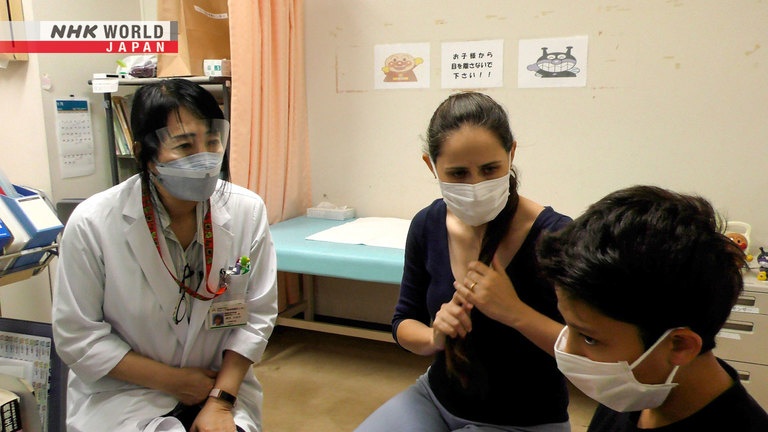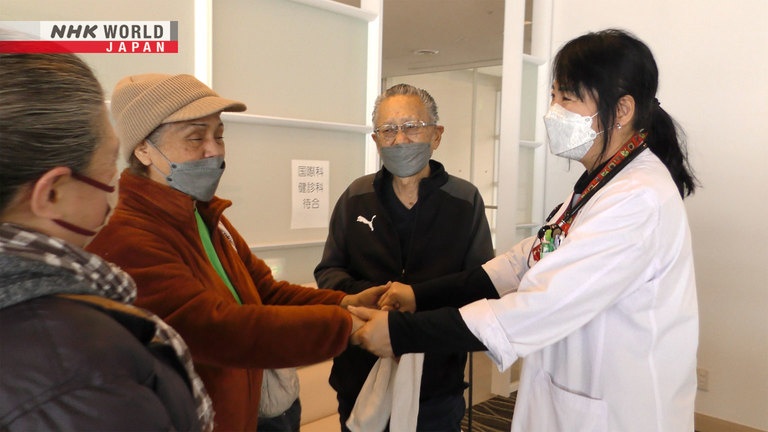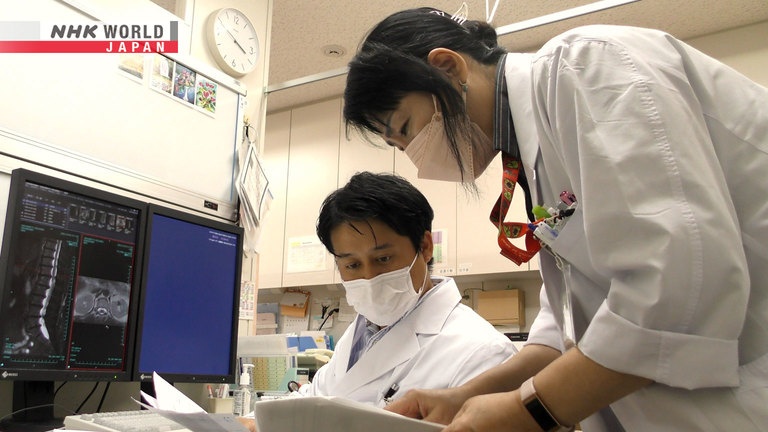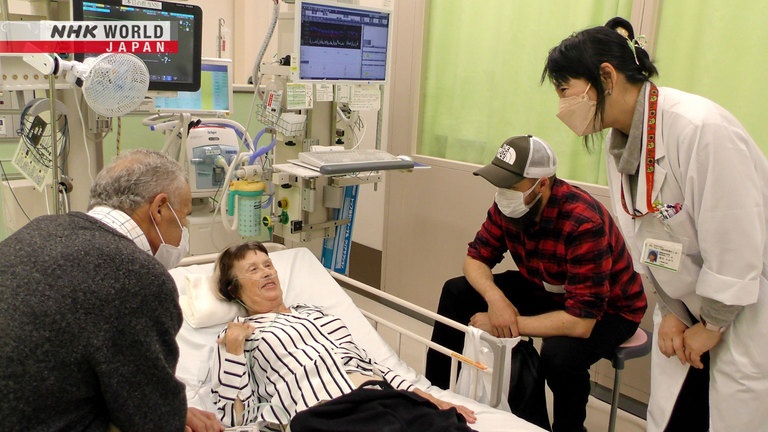Medical Interpreting Pioneer - Minamitani Kaori
Follow Dr. Minamitani Kaori, head of a pioneering medical center in Osaka Prefecture that is leading the way in providing care to patients from overseas with limited Japanese skills.




Transcript
FRONTRUNNERS
Has his fever come down this morning?
This hospital for language is very good service.
They have a translator.
It's great to have interpreting for patients with no Japanese or English.
I want to give foreigners the same level of care as Japanese patients.
What a marvelous doctor we have!
Medical interpreting pioneer
Minamitani Kaori
Kansai International Airport is a key gateway to Western Japan,
used by some 40,000 international travelers each day.
Around ten minutes' drive away
is the publicly-run Rinku General Medical Center.
Good morning!
As a physician who specializes in international patients,
Dr. Minamitani Kaori is a rarity in Japan.
So, vomiting and a fever?
Are you the patient? Oh, your child?
Her team takes a call from a Brazilian father.
We expect him to bring his child, who has a fever and vomiting.
As well as Portuguese, Minamitani is fluent in Spanish and English.
Skills that she's used to break new ground in medical interpreting
for international patients in Japan.
Today's call was from this Brazilian family,
who moved to the country two years ago.
Our kids speak some Japanese because they study it at school.
But it's hard for me to follow the doctor.
I'm here to interpret.
In fact, Minamitani too grew up in Brazil,
and she combines those language skills with twin medical diplomas,
earned there and in Japan.
Has his fever come down this morning?
It came down a little around 5 a.m.
Did he take any medicine?
Just some medicine I had from Brazil.
She gave him some meds from Brazil.
Dr. Minamitani assists throughout the consultation.
And her contribution is crucial to providing the doctor
with all the necessary information.
The diagnosis is viral gastroenteritis.
I'll prescribe some anti-nausea meds.
He can stop if his symptoms improve.
Only around ten percent of medical establishments in Japan
are equipped to support international patients in this way.
Our outpatient doctors have to see so many patients.
So while speed is of the essence, so is accurate communication.
It's crucial to interpret things correctly.
My aim is to ensure that potentially challenging consultations
with international patients can be concluded swiftly and smoothly.
Next, we join Dr. Minamitani for an orthopedic consultation.
The patient is Japanese Peruvian Hashimoto Rosario,
who is suffering from lower back pain.
I've lived in Japan for a long time, but spend almost all my time working.
I've only ever learned basic Japanese. I can't really read or write.
Ahead of the consultation, Minamitani ascertains the details in Spanish.
So, you've taken some painkillers?
Yes. I couldn't stand the pain. It's extremely painful.
And I have bad pins and needles.
Tingling?
Yes, right down to my fingers. In Peru, they said it was quite advanced.
On a recent trip back to Peru,
Hashimoto went to a doctor who said she had a severe disc herniation
that would require surgery.
Minamitani briefs specialist, Dr. Kishimoto Koki on what she has found out.
Hello.
Hi there. So, what seems to be the problem?
Hashimoto has brought along her medical report from Peru,
but Dr. Kishimoto needs help to decipher the key information.
She has mild scoliosis and kyphosis. And a number of bone spurs.
There's no apparent lumbar myelitis.
But there is some in the cervical area.
Cross referencing the report from Peru with a fresh MRI scan
helps them to quickly determine the appropriate diagnosis.
Thanks very much.
It'd take ages to write all this out, so it's quicker to talk directly.
And now Hashimoto's official consultation can begin.
Hi there, Doc. How are you?
Where does it hurt?
Right here.
There is a herniation, but it's not impinging upon the nerve much.
Even if we operated, it wouldn't solve your pain.
Your posture is causing muscular pain here.
So let's correct that with physiotherapy.
No need for an operation.
So I need to straighten up, like so?
Thank you, Doc. Gracias.
And Dr. Minamitani follows up with Hashimoto right after the consultation,
to make sure she took everything in.
It's good that you don't need surgery.
But I will need some treatment, right?
Yes, some physiotherapy.
Dr. Minamitani is amazing.
Even if you're fluent in another language,
it's tough to correctly interpret
the full breadth of medical terms and their meanings.
Without her here,
we might even have to ask patients to come back another day
to give us time to get everything translated accurately in advance
before a consultation.
And that makes a difference of several weeks.
Some 300,000 of Japan's 3.2 million foreign residents live in Osaka,
making it the country's third largest international community.
And at Rinku Medical Center,
with around 1,500 consultations each year,
things are often too busy for interpreters
to even relax on their lunch break.
I packed my own lunch.
Most evenings, Dr. Minamitani cooks an extra-large supper,
and brings the leftovers for lunch the next day.
It's a meat and vegetable stir-fry.
Last night, I didn't get home and start cooking until around 9 p.m.
But I'm so used to being busy that it feels odd to get out before dark.
Like, is it OK to finish work so early?
It's not unusual for me to end up cooking dinner at around 10 o'clock.
And this level of commitment
is inspired by Dr. Minamitani's own personal experience.
On a weekend off, we find her in Kichijoji, Tokyo,
for a special reunion.
It's with old classmates. Some who I haven't seen for 45 years.
Hey there!
Well, this takes me back!
Kaori hasn't changed at all!
I wouldn't say that!
Cheers!
Everyone here went to the same Japanese after school classes in Brazil.
This is our ninth-grade graduation!
It was her father's career as an engineer
that took Minamitani Kaori and her family to Brazil
when she was just 11 years old.
We were in the same class, but Kaori seemed older. More mature.
Really?
You were so kind to the younger kids.
They loved you like a teacher, or like a big sister.
But you were kind of reserved, too.
Reserved? Me?
Back then, I thought I was only shy around Brazilian people.
My Portuguese wasn't great, so I kept myself to myself.
Minamitani took Japanese class
parallel to attending a regular Brazilian school.
But thrust into classes where she didn't understand the language,
she gradually became more introverted.
And she sees a similar pattern today
among international patients at her hospital.
I remember all these times when everyone was talking and laughing together,
and I couldn't keep up with the Portuguese.
But to try and fit in, I just pretended to laugh along.
Laughing along though I didn't know why.
Sometimes they'd ask, "Did you get it?"
It was a common occurrence.
And nowadays, I get patients who come in and say they speak a little Japanese.
The doctor will try to check if they get what they're hearing,
and they always say "Yes, yes."
But I know they don't. It's just like I used to be.
After high school, in search of a career
that would be immune to economic fluctuations,
she took a medical degree at a Brazilian university.
But despite qualifying as a radiologist,
her foreign nationality made steady employment opportunities hard to come by.
So in 1992, she returned to Japan
to study for a second medical degree at Osaka University.
But shortly after graduating and joining Rinku Medical Center,
something happened that would change the course of her life.
Another department had regular Brazilian patients,
and they'd call me in to interpret.
It began to happen more and more often.
I really hadn't expected so much demand
for my Portuguese back here in Japan.
The hospital was planning to create a team to support foreign patients.
And I just happened to be here in the right place at the right time.
In 2006, Dr. Minamitani oversaw the launch of a new "international clinic"
to care for patients who don't speak Japanese.
Eighteen years later, the nine full-time staff and a roster of part-timers
can accommodate around 30 languages.
I've experienced for myself what it's like to struggle
with language and cultural differences overseas.
So I try to think very carefully about what to ask our patients
and how best to talk to them.
Since its launch, the international clinic has handled
some 16,000 medical consultations.
And as well as interpreting,
the team plays a vital role in setting patients' minds at ease.
Here's a thank you letter from one such patient.
I will even go to the football this Saturday with my three daughters.
I still think of all the kindnesses shown to me, and the wonderful staff.
I will never forget that.
And some patients stay in touch even after their treatment is over.
How've you been?
I've been OK, thanks to God. Or should I say, thanks to us!
Marcos Lachman is another Brazilian former patient.
In 2007, as a pilot on a flight from the US to Malaysia,
he suffered a sudden seizure,
forcing an emergency landing at Kansai International Airport.
He was rushed to Minamitani's hospital
where they discovered a brain tumor in need of urgent, highly risky surgery.
It was a very serious case.
So we had to explain the situation, and the need for surgery in Japan.
That's where I came in.
It's thanks to you that I decided to stay in Osaka for the operation.
Ahead of my surgery,
you gave me an in-depth explanation of all the risks.
With Dr. Minamitani's support,
Lachman made it safely through the 12-hour operation
with no lingering aftereffects,
and he remains in good health today.
Everybody's mood changes when the interpreter arrives.
They are excited to be able to speak their own language,
and often just blurt out all the things they'd been struggling to communicate.
They're so pleased to just let the conversation flow,
and those moments are very rewarding.
We join Dr. Minamitani on another assignment
as she supports a patient preparing for heart surgery.
Diagnosed with an obstruction to
one of the blood vessels supplying his heart muscles,
Colombian-born Tanaka Eiichi
is set to have the problem artery widened by inserting a catheter.
And after the hour-long procedure is over,
Minamitani goes to check on him.
First, let's sit you up.
Relax. That's good.
Take it nice and easy.
Tanaka's Japanese parents emigrated to Colombia before he was born,
to build a new life for themselves as farmers.
Thirty years ago, he returned to Japan with his own family,
to work in a textile factory.
He now lives in the nearby city of Sennan.
Unable to understand much Japanese,
for many day-to-day tasks, he relies on his daughter, Ines.
Welcome!
What's this?
Hamburger and potato salad.
Thank you.
Some time has passed since Tanaka first began to feel unwell.
I was at a gasoline stand, and suddenly I felt a pain in my chest.
It went on for about 30 minutes.
My friend who was with me said I should go to a nearby hospital.
So I did, but it didn't go so well.
If you don't speak Japanese, you can't understand the doctor.
Due to the language barrier, they just sent him home.
It's been very stressful for him.
Worried for her father's health,
Ines recommended he seek out Dr. Minamitani's hospital.
After the operation, Minamitani provides Tanaka's family
with feedback from the surgeon.
Here is your artery before surgery. You can see it's sort of crooked.
You mean this bit here?
The artery was constricted.
And Dr. Minamitani's presence gives the family the confidence to ask questions.
And the catheter's widened it, right?
Yes, that's right.
So the blood can flow through freely?
Yes, that's right.
Many international patients can feel quite uneasy
about needing treatment in Japan.
And the language barrier is an issue for medics too.
Facilitating smooth conversation lets the information flow freely,
which helps build trust.
It's really important to give patients that peace of mind.
The next day...
Hi there, how are you feeling? OK?
Yes, pretty good. Relieved.
And Tanaka is already able to return home with no major issues.
He wasn't a good color before the op, but he looks much better already.
I bet he was worried about surgery. You must be relieved now it's over.
We're all so grateful to God.
I thought we were going to lose him.
I guess we've kept God waiting, huh?
What a marvelous doctor we have!
You feel just like part of our family!
Another daughter!
But not all patients can complete their treatment in one location.
While our crew was following Minamitani,
she had to assist in the repatriation of one intensive care patient.
Neroli Waymouth was in Japan on holiday from Australia with her husband.
But right before boarding their flight home,
she was overcome with breathing difficulties
and rushed here from Kansai Airport.
Diagnosed with acute pneumonia,
even after three weeks in hospital she is still too weak to stand.
But her family are keen to get her back home as soon as possible.
And to surmount any language barriers during this sensitive challenge,
Dr. Minamitani steps in to oversee proceedings.
One vital step is coordinating
with Waymouth's travel insurance provider in Australia
to establish the necessary equipment and approaches
for a safe flight home.
Hi.
Hello.
Are you ready now?
I'm ready, yes.
Thank you. The doctor has just arrived here.
She has limited movement in her legs. So there's a risk of DVT on the flight.
Waymouth's nurse explains potentially life-saving mitigations
to be conducted mid-flight.
Some sort of foot pump or massage?
They won't have foot pumps in the plane.
How about anticoagulants?
The team proposes various solutions to ensure the patient's safe return.
It's an eight to ten-hour journey, so it won't be necessary.
However, what we would normally suggest is to have anticoagulants.
Besides medication,
they decide that the nurse should accompany her on the flight.
OK.
Thank you.
A week later, and Neroli Waymouth is ready for the journey home.
Hi, how have you been?
Good. I'm all dressed up. Ready to go.
Happy to go home.
Yes.
"Yes." I know.
We hope that you will come back here again to travel more.
Not to stay in a hospital.
We'll come and visit.
Thank you, thank you.
We do need you very much to help us.
You've done a wonderful thing.
You and your team. They were all wonderful.
All very good. Very kind.
So what is it that motivates Minamitani Kaori in her work
with international patients?
My main motivation is to make sure
we can send patients home healthy and satisfied.
I want to give foreigners the same level of treatment as Japanese patients.